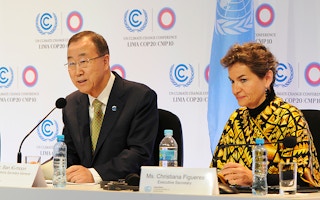The government of Costa Rica on Thursday nominated former United Nations climate change head Christiana Figueres to be the next UN Secretary-General, a post Ban Ki-moon will step down from at the end of this year.
To continue reading, subscribe to Eco‑Business.
There's something for everyone. We offer a range of subscription plans.
- Access our stories and receive our Insights Weekly newsletter with the free EB Member plan.
- Unlock unlimited access to our content and archive with EB Circle.
- Publish your content with EB Premium.
The announcement comes a day after Figueres completed her six-year term at the United Nations Framework Convention on Climate Change, where she was hailed as a key player in shaping the historic climate change agreement inked in Paris by world leaders last December.
The Paris deal was the world’s first universal agreement on reducing greenhouse gas emissions, and saw 195 global leaders pledging to reach net zero greenhouse gas emissions by the second half of the century and cap global temperature rise at 2 degrees Celsius above pre-industrial levels.
Costa Rican president Luis Guillermo Solís, who announced Figueres’ nomination in the country’s National Theatre, praised her as someone “who can listen and consult, who can help resolve disputes, build agreements and anticipate problems”.
He added: “Christiana Figueres has the skills to help the UN face its responsibility of building peace, resilience and opportunity at a time of change.”
Figueres will compete with candidates such as former New Zealand prime minister and UN Development Programme head Helen Clark, UN Educational, Scientific and Cultural Organization (UNESCO) head Irina Bokova and Moldovan foreign affairs minister Natalia Gherman, among others, for the Secretary-General role.
Her campaign, themed “Planting the seeds of hope today to harvest peace tomorrow“, prioritises the peaceful settlement of disputes among states, peace-building, and strengthening the UN’s organisational capabilities. It also aims to forge a model of “collaborative diplomacy”, where global decisions are made multilaterally.
“The UN needs a leader who is able to build teams with the skills and experience needed to deliver outcomes,” said Figueres in a statement. “The world also needs an inspirational leader who rekindles the sense of hope and determination that characterised the UN at its birth”.
“I believe I can be that leader,” she added.
The UN General Assembly will make a decision on who the next Secretary-General will be by the end of this year.
Meanwhile, analysts noted that no matter who the next UN chief is, they must factor in climate change as a key driver of global conflict and instability, and reform the UN itself to deal with climate risks.
London-headquartered climate change think-tank, E3G, for example, published a new report on Thursday outlining key recommendations for the UN to do this.
The report’s suggestions included reforms within UN institutions to develop a consistent mechanism for understanding and managing exposure to climate risks across the organisation, and implementing processes to monitor global climate tipping points such as the collapse of the West Antarctic ice sheet.
The UN should also improve its understanding of climate risks, suggested the report. While the Intergovernmental Panel on Climate Change explores the scientific, technical and socio-economic aspects of climate risks, it said more work is needed to help decision-makers understand the consequences of knock-on climate impacts such as food shortage, water scarcity, and conflict.
E3G’s chief executive Nick Mabey noted in a statement that “we need the UN more than ever - it is an important constant that transcends social and political unrest - but we need it to be fit for purpose”.
He added: “The new Secretary General must follow through on the major international agreements struck last year and climate proof the UN system.”










